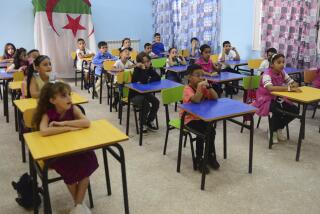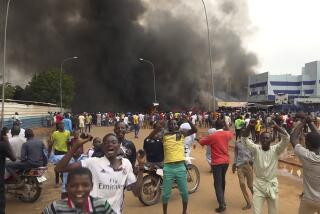Vive la Difference Out of Tune With the New Bilingual Blues
- Share via
SANTA, Cameroon — There’s no border post at the edge of this little town, no immigration officers stamping passports.
But maybe there should be.
“Over there they are French,” said Joseph Tanchi, waving his hand dismissively toward the village of Kombou, about three miles down the road.
“Here we are English--so we only know English people.”
In reality, almost no one in this corner of Cameroon is either English or French. As you’d expect, they’re Cameroonian.
But on the road between Kombou and Santa, a winding, well-paved stretch leading into this nation’s eastern highlands, two languages bump up against one another in a complicated and fractious relationship born of the colonial past.
If people are tied together by nationality in Cameroon, they have been kept firmly apart by language.
Although the country recognizes both French and English as its official languages, the ruling class is French-speaking, or Francophone, and has long viewed English as second-class, while the English-speakers, or Anglophones, barely hide their animosity beneath Cameroon’s largely peaceful surface.
Slowly, though, things have been changing, and English-speakers now find their language isn’t quite so disdained.
Language schools are jammed with people studying English, and city streets are plastered with ads for English lessons.
For decades, France was where Cameroon and nearly every other French-speaking nation in Africa turned for help and guidance.
Paris kept a close watch on its former colonies, helped govern many of them and stood at the ready with economic aid and planeloads of paratroopers to put down rebellions.
But French influence has been in retreat in Africa. Politicians in Paris, weary of the economic and military costs, have allowed ties with the continent to fray.
Meanwhile, Cameroon’s solid economy has faltered under poor management, low prices for coffee exports and corruption in the authoritarian government.
These days, ambitious Cameroonians must look outside France for opportunities. English, with its increasing dominance as the global economic language, seems more attractive.
“My interest is not actually geared toward learning the Anglophone culture, or the British culture,” said Carine Benga, a 19-year-old Francophone signing up for English classes in Yaounde, Cameroon’s capital, and hoping to profit from the Internet boom. “I simply want to learn English.”
The French are well known for their sensitivity about their language. But the gains of English in Cameroon don’t mean French is in retreat, said Alain Marquer, director for international relations of Alliance Francaise, which promotes French language and culture worldwide.
“I don’t think it’s a threat to the French language. We have to fight for multilingualism. We’re not fighting against English,” he said.
The demand for English in Cameroon isn’t surprising, he said, since “it is the English language that is attractive to the job market.”
But Marquer’s tolerant approach isn’t widely shared in Cameroon. Its Anglophones complain about French linguistic chauvinists who are rude to visitors and drink bottled beer instead of palm wine. Francophones deride Anglophones for wearing loud clothes, being too stiff, and making too much of the language issue.
“Today there is the feeling that our Anglophone brothers’ linguistic background has become their entire identity,” sniffed Augustin-Frederick Kodock, a prominent Francophone politician.
Although nearly all modern African states carry the burden of their haphazard colonial creations--with borders that divide ethnic territories, or tie vastly diverse peoples into volatile combinations--Cameroon’s formation is particularly complex.
Originally a German-controlled protectorate, it was divided between France and England after World War I. In a plebiscite in the formerly British sector in 1961, a year after independence, some voted to join English-speaking Nigeria, while the others opted for French-speaking Cameroon.
It was those others who now make up 15% of the population of 15.5 million.
Today, even in Anglophone areas, most TV and radio broadcasts are in French, though schools and newspapers do operate in English in those regions.
On the road from Kombou to Santa, the stifling heat of lowland Cameroon gives way to the cool of the English-speaking eastern hills, and the vocabulary changes too. The “bonjour” heard in Kombou suddenly mutates into “good morning,” and stores like La Boutique de Savoir surrender to the Zion Credit Finance Ltd.
Often, it all seems harmless. But when tensions have run high, such as during the 1997 presidential elections, talk has even turned to the possibility of outright revolt.
“The tension has reduced to a certain extent,” said John Fru Ndi, the head of the opposition Social Democratic Front, the English-speakers’ main political party, “but we still have a French-speaking population here that thinks that if an English-speaker isn’t a stooge to the French, they can’t be a leader in this country.”
More to Read
Sign up for Essential California
The most important California stories and recommendations in your inbox every morning.
You may occasionally receive promotional content from the Los Angeles Times.













